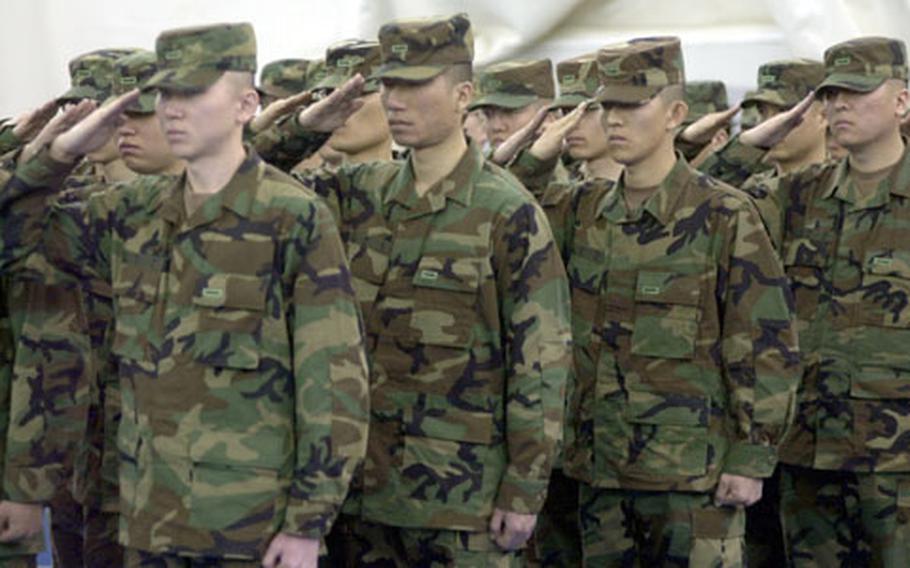
Korean Augmentees to the U.S. Army, or KATUSAs, salute Thursday during their graduation from the KATUSA Training Academy at Camp Jackson, South Korea. The soldiers, conscripted for two years, attend the KTA after completing basic training with Republic of Korea Army soldiers. The KTA introduces them to the U.S. Army way of doing things before they join U.S. Army units for service. KATUSAs wear U.S. Army uniforms with slight modifications (rank and name, in Korean, on pockets). (Juliana Gittler / Stars and Stripes)
CAMP JACKSON, South Korea — It’s a two-year break from his career in business management and human resources, but Tae Won Jung doesn’t mind the digression.
Now a private, Jung became a key part of the U.S. Army’s mission in South Korea last week, a Korean Augmentee to the U.S. Army, better known as KATUSA.
South Korean men are required to spend two years in government service. Some join the military or national police, but about 2,000 each year become KATUSAs and strengthen the U.S. Army.
“It’s an honor and a privilege to be here. Especially to be a KATUSA. It’s very competitive,” Jung said.
The KATUSA system developed 50 years ago during the Korean War to add manpower to arriving U.S. Army units.
Only those who can pass an English proficiency exam are eligible to be KATUSAs. They are paid by South Korea but live, work and eat with 8th Army soldiers around the peninsula. They not only add troop strength, they form a bridge between GIs and the host nation they live in.
Most KATUSAs are college graduates or are taking a break from college and many have lived in the United States.
They start their military journey with five weeks of basic training with Republic of Korea Army soldiers. They learn to shoot, move and communicate, the foundations of soldiering.
From there, they enter a 21-day KATUSA Training Academy designed to ready them for life with the U.S. Army.
The KTA is housed at Camp Jackson, home to the Army’s noncommissioned officer school.
“This is a unique academy we have here in the Army,” said Command Sgt. Maj. Timothy D. Lane, commandant of the KTA and the noncommissioned officer course.
The KTA is a transition course “to make sure they understand the process they’ll be going through,” Lane said.
The fundamentals of the two training programs are the same, but KATUSAs must learn about U.S. military customs and drills, and small things that are different between the armies, said Master Sgt. Ronald Sumler, chief instructor at the KTA.
South Korean soldiers salute everyone above their rank, officer and enlisted. They wear their uniforms differently and have different protocols.
“It’s more of a familiarization so when they get to their units they’ll be comfortable. We teach them how we do things in our Army,” said Sgt. 1st Class Ed Nazimiec, first platoon sergeant for the KTA.
The academy starts with English lessons for many KATUSAs. While they speak proficient English, they may not feel comfortable giving and receiving precise orders in English, Lane said.
KATUSAs also receive cultural education to understand what makes Americans tick, and what misconceptions or impressions Americans might have about Koreans.
Understanding those differences can help a KATUSA diffuse a bad situation based on a cultural misunderstanding.
Jung will serve as a translator for the U.S. Army, and he imagines that will include language and cultural issues.
“I think that I could be a great help here for U.S. soldiers,” Jung said. “I understand both cultures.”
He spent much of his life in Boston and attended college and worked in the States before returning to South Korea for his service. He soon will work with soldiers from all over the United States who may be unaccustomed to foreign cultures.
Recent academy graduate Pvt. V.J. Ha lived in Virginia and graduated from Virginia Tech after studying industrial system engineering. He plans to return to complete his master’s degree after his two-year service.
Ha said being a KATUSA is an honor because he can assist Americans serving in South Korea.
“We have to help them out doing their job here,” he said.
The academy is staffed by noncommissioned officers from a variety of job specialties along with several South Korean soldiers and KATUSAs. It teaches about 160 recruits 14 times a year.
Jung said his friends in Boston couldn’t understand why he had to return to his motherland and join a military. He didn’t really know either.
“I wasn’t too fond of [serving] until I joined. Then I realized what an honor it is,” he said.
“I’ve got a lot of friends (in Boston) who will never experience shooting a weapon or be in a situation where discipline comes before anything else,” he said. “I’m a true soldier.”